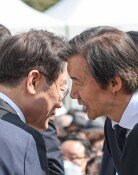Koizumis theater politics comes to end in Japan
Koizumis theater politics comes to end in Japan
Posted February. 11, 2014 07:12,
Theater politics of former Japanese Prime Minister Junichiro Koizumi, 71, no longer worked. Having served as premier for five years and five months, the third longest term since Japans defeat in World War II, Koizumi earned the nickname theater politics, because he conducted politics as if doing glaring acting onstage.
However, in an election to elect Tokyo governor held on Sunday, former Prime Minister Morihiro Hosokawa, 76, who Koizumi fully supported, only ranked third. Why was Koizumi fever not generated?
Koizumis political style is to address and overcome a single issue. In an election, he tends to focus on a single theme and earns public support. In the September, 2005 general elections, he used 81 percent of his speeches to address privatization of postal service, and achieved a record-breaking landslide win (327 seats) that exceeds the quorum of seats required for constitutional amendment. In the latest Tokyo governor election, he used 85 percent of his speeches on ending the nuclear energy era.
However, the biggest concern among the residents in Tokyo Province was not nuclear power plants. As the province did not have any single plant in the district, residents did not consider nuclear power plants an urgent matter. On the reason for the election of former welfare and labor minister Yoichi Masuzoe who the Liberal Democratic Party fully supported, Shigeru Ishiba, chief secretary of the LDP, told a press conference on Sunday that (Voters) understood his calls for economy, medicine and welfare as realistic and specific matters.
The sense of newness was also lacking. The Hosokawa-Koizumi combination was a coalition of big shots, who served as former prime ministers. However, the big guns in their 70s failed to wield notable influence among younger generation. According to an exit poll by the Asahi Shimbun, Hosokawa only garnered 11 percent and 15 percent from people in their 20s and 30s, respectively. It was the lowest approval rating among the four major candidates, including Masuzoe, Kenji Utsunomiya, 67, former chair of the Japanese bar association; and Toshio Tamogami, 65, former Air Force Chief of General Staff.
Koizumi declared that his challenge has yet to end. In a handwritten note on his feeling on Sunday, he said, It was regrettable outcome, but I will continue my endeavor to establish a zero nuclear energy country with what energy I have.
In contrast, with the election of Masuzoe, who Prime Minister Shinzo Abe so strongly supported to go as far as delivering endorsement speeches in person, Abes policy to resume operation of nuclear power plants, and allowance of collective self-defense right will likely gather momentum.







